

Leadership & Strategy: Nine Ways Tim Cook Has Transformed Apple Since He Became CEO. Zappos CEO Tony Hsieh On Leadership. BBC chairman quits for BT role. The BBC chairman, Christopher Bland, was today confirmed as replacement for his counterpart at BT, Sir Iain Vallance, who has bowed to shareholder pressure and decided to step down.
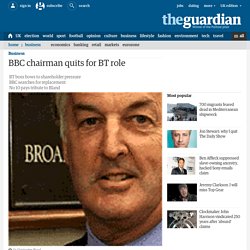
Sir Christopher will take up his new post at BT on May 1, although Sir Iain is to stay on as "president emeritus" of the company until July 2002. Sir Iain, who has been with BT since 1987, has been criticised as BT's debt has mounted and its stock price plummeted in recent months. "For some time now I have felt it right that I should stand down once we could find an able successor," he said. He has also come under pressure to cut the group's massive £30bn debt mountain, built up from buying third-generation mobile phone operations and stakes in overseas companies.
BT, which was once a state-owned monopoly, said its new chairman would be Sir Christopher, who has headed the BBC's board of governors since 1996. 3.2.1 leadership model - tannenbaum and schmidt continuum management theory. This webpage is a new format for mobile/small screens.
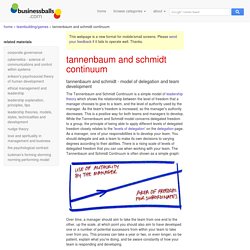
Please send your feedback if it fails to operate well. Thanks. tannenbaum and schmidt - model of delegation and team development The Tannenbaum and Schmidt Continuum is a simple model of leadership theory which shows the relationship between the level of freedom that a manager chooses to give to a team, and the level of authority used by the manager. As the team's freedom is increased, so the manager's authority decreases. Over time, a manager should aim to take the team from one end to the other, up the scale, at which point you should also aim to have developed one or a number of potential successors from within your team to take over from you. 3.2 Starbucks drops its name and the word coffee from logo. Starbucks, the world's largest chain of coffee shops, has unveiled a new logo which it says indicates its intention to move beyond its core product.
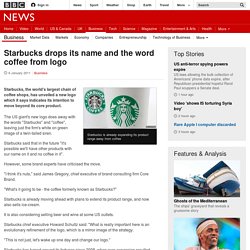
The US giant's new logo does away with the words "Starbucks" and "coffee", leaving just the firm's white on green image of a twin-tailed siren. Starbucks said that in the future "it's possible we'll have other products with our name on it and no coffee in it". However, some brand experts have criticised the move. "I think it's nuts," said James Gregory, chief executive of brand consulting firm Core Brand.
"What's it going to be - the coffee formerly known as Starbucks? " Starbucks is already moving ahead with plans to extend its product range, and now also sells ice-cream. It is also considering selling beer and wine at some US outlets. Starbucks chief executive Howard Schultz said: "What is really important here is an evolutionary refinement of the logo, which is a mirror image of the strategy. 3.2.3. Stakeholder conflict in the battle over Royal Mail. This is a long running story, in which Royal Mail is (probably) preparing to leave the public sector and become a private company - a process known as privatisation.
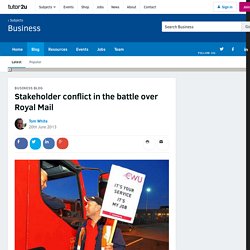
Recently, rising profits at the business had made its privatisation seem more likely, but Royal Mail workers have just voted overwhelmingly against the government's controversial plan to sell off the 497-year-old postal service. According to The Guardian, more than 96% of postal workers who voted opposed the privatisation despite the government promising them each about £1,500 in shares as part of the flotation plan. The general secretary of the Communication Workers Union (CWU) said: "No one has yet asked postal workers what they think about privatisation. Today postal workers have spoken loud and clear. 3.2.3 - Business ethics in fashion. 3.2.3. - Fake Farming - Tesco and Business Ethics. For many consumers, the name on the package doesn't matter.
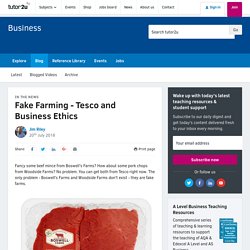
For them, price is likely to be key. However, for an increasing number of consumers, the "provenance" of a product is an important factor in a purchase decision. Might you be reassured to know that your beef mince comes from Boswell's Farm? The supplier sounds authentic. A real farm making premium beef mince. So imagine how you might feel when you discover that Boswell's Farms, Woodside Farm's and a host of other similar "sources" are just the figment of the marketing department's imagination.
That is the reason why the National Farmer's Union (NFU) has submitted a formal complaint to the National Trading Standards over the use of ‘fake’ farm branding by retailers on some food products. The NFU claim that the use of fake farms and other similar brands confuses customers. Is it ethical to arguably mislead consumers like this? Or does it simply not matter, provided the beef mince and pork chops taste great?